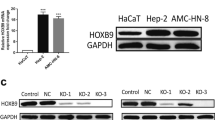Abstract
Partner of sld five 1 (PSF1) is a member of the heterotetrameric complex termed GINS. Previous studies have shown that PSF1 is unregulated in several cancer and associated with tumor malignant characters. However, the effects of PSF1 in lung cancer are still unclear. The goal of this study was to investigate the effects of PSF1 on the proliferation capacities of lung cancer. To start with, expression of PSF1 in 22 human lung cancer samples and adjacent non-tumor samples were detected by real-time RT-PCR and Western blotting. Our results showed that PSF1 was overexpressed in lung cancer samples compared to adjacent non-tumor samples. To achieve better insights of PSF1 functions in lung cancer cells, we used PSF1-specific small interfering RNA (siRNA) successfully inhibit the expression of PSF1 in messenger RNA (mRNA) and protein levels. In addition, we used lung cancer cell lines with different p53 gene background (p53 null and p53 wild-type). The results showed that knockdown of PSF1 inhibited cell proliferation and caused cell cycle arrest of lung cancer cells in a p53-independent manner. Our data indicated that PSF1 is functionally involved in lung cancer cell proliferation and is a potential target for lung cancer therapy.





Similar content being viewed by others
References
Jemal A, Bray F, Center MM, Ferlay J, Ward E, Forman D. Global cancer statistics. CA Cancer J Clin. 2011;61(2):69–90. doi:10.3322/caac.20107.
Blanco R, Maestu I, de la Torre MG, Cassinello A, Nunez I. A review of the management of elderly patients with non-small-cell lung cancer. Ann Oncol Off J Eur Soc Med Oncol ESMO. 2014. doi:10.1093/annonc/mdu268.
Jemal A, Center MM, DeSantis C, Ward EM. Global patterns of cancer incidence and mortality rates and trends. Cancer epidemiology, biomarkers & prevention: a publication of the American Association for Cancer Research, cosponsored by the Am Soc Prevent Oncol. 2010;19(8):1893–907. doi:10.1158/1055-9965.EPI-10-0437.
Huang CH, Chang PM, Lin YJ, Wang CH, Huang CY, Ng KL. Drug repositioning discovery for early- and late-stage non-small-cell lung cancer. BioMed Res Int. 2014;2014:193817. doi:10.1155/2014/193817.
Reungwetwattana T, Dy GK. Targeted therapies in development for non-small cell lung cancer. J Carcinog. 2013;12:22. doi:10.4103/1477-3163.123972.
Nagahama Y, Ueno M, Miyamoto S, Morii E, Minami T, Mochizuki N, et al. PSF1, a DNA replication factor expressed widely in stem and progenitor cells, drives tumorigenic and metastatic properties. Cancer Res. 2010;70(3):1215–24. doi:10.1158/0008-5472.CAN-09-3662.
Ueno M, Itoh M, Kong L, Sugihara K, Asano M, Takakura N. PSF1 is essential for early embryogenesis in mice. Mol Cell Biol. 2005;25(23):10528–32. doi:10.1128/MCB. 25.23.10528-10532.2005.
Matsui T, Kinugasa Y, Tahara H, Kanakura Y, Takakura N. Possible role of mural cell-covered mature blood vessels in inducing drug resistance in cancer-initiating cells. Am J Pathol. 2013;182(5):1790–9. doi:10.1016/j.ajpath.2013.01.019.
Hokka D, Maniwa Y, Tane S, Nishio W, Yoshimura M, Okita Y, et al. Psf3 is a prognostic biomarker in lung adenocarcinoma. Lung Cancer. 2013;79(1):77–82. doi:10.1016/j.lungcan.2012.10.001.
Wen JZ, Han XY, Wei B, Zhang S, Wei HB. Expression of PSF1 in colon cancer tissues and its effect on the proliferation of colon cancer cells. Zhonghua wei chang wai ke za zhi = Chin J Gastrointest Surg. 2013;16(1):70–4.
Zhou L, Sun XJ, Liu C, Wu QF, Tai MH, Wei JC, et al. Overexpression of PSF1 is correlated with poor prognosis in hepatocellular carcinoma patients. Int J Biol Markers. 2014. doi:10.5301/jbm.5000105.
Obama K, Ura K, Satoh S, Nakamura Y, Furukawa Y. Up-regulation of PSF2, a member of the GINS multiprotein complex, in intrahepatic cholangiocarcinoma. Oncol Rep. 2005;14(3):701–6.
Pai CC, Garcia I, Wang SW, Cotterill S, Macneill SA, Kearsey SE. GINS inactivation phenotypes reveal two pathways for chromatin association of replicative alpha and epsilon DNA polymerases in fission yeast. Mol Biol Cell. 2009;20(4):1213–22. doi:10.1091/mbc.E08-04-0429.
Nagahama Y, Ueno M, Haraguchi N, Mori M, Takakura N. PSF3 marks malignant colon cancer and has a role in cancer cell proliferation. Biochem Biophys Res Commun. 2010;392(2):150–4. doi:10.1016/j.bbrc.2009.12.174.
Ryu B, Kim DS, Deluca AM, Alani RM. Comprehensive expression profiling of tumor cell lines identifies molecular signatures of melanoma progression. PLoS One. 2007;2(7):e594. doi:10.1371/journal.pone.0000594.
Nakahara I, Miyamoto M, Shibata T, Akashi-Tanaka S, Kinoshita T, Mogushi K, et al. Up-regulation of PSF1 promotes the growth of breast cancer cells. Genes Cells Devoted Mol Cell Mech. 2010;15(10):1015–24. doi:10.1111/j.1365-2443.2010.01442.x.
Elias J, Dimitrio L, Clairambault J, Natalini R. The p53 protein and its molecular network: modelling a missing link between DNA damage and cell fate. Biochimica et biophysica acta. 2014;1844(1 Pt B):232–47. doi:10.1016/j.bbapap.2013.09.019.
Hong B, van den Heuvel AP, Prabhu VV, Zhang S, El-Deiry WS. Targeting tumor suppressor p53 for cancer therapy: strategies, challenges and opportunities. Curr Drug Targets. 2014;15(1):80–9.
Loayza-Puch F, Drost J, Rooijers K, Lopes R, Elkon R, Agami R. p53 induces transcriptional and translational programs to suppress cell proliferation and growth. Genome Biol. 2013;14(4):R32. doi:10.1186/gb-2013-14-4-r32.
Kumar S. P53 induction accompanying G2/M arrest upon knockdown of tumor suppressor HIC1 in U87MG glioma cells. Mol Cell Biochem. 2014;395(1–2):281–90. doi:10.1007/s11010-014-2137-9.
Acknowledgments
This project was supported by China Postdoctoral Science Foundation funded project (2013M532058) and Key Science and Technology Project of Shaanxi Province (2013K12-08-01).
Conflicts of interest
None
Author information
Authors and Affiliations
Corresponding author
Rights and permissions
About this article
Cite this article
Zhang, J., Wu, Q., Wang, Z. et al. Knockdown of PSF1 expression inhibits cell proliferation in lung cancer cells in vitro. Tumor Biol. 36, 2163–2168 (2015). https://doi.org/10.1007/s13277-014-2826-8
Received:
Accepted:
Published:
Issue Date:
DOI: https://doi.org/10.1007/s13277-014-2826-8




